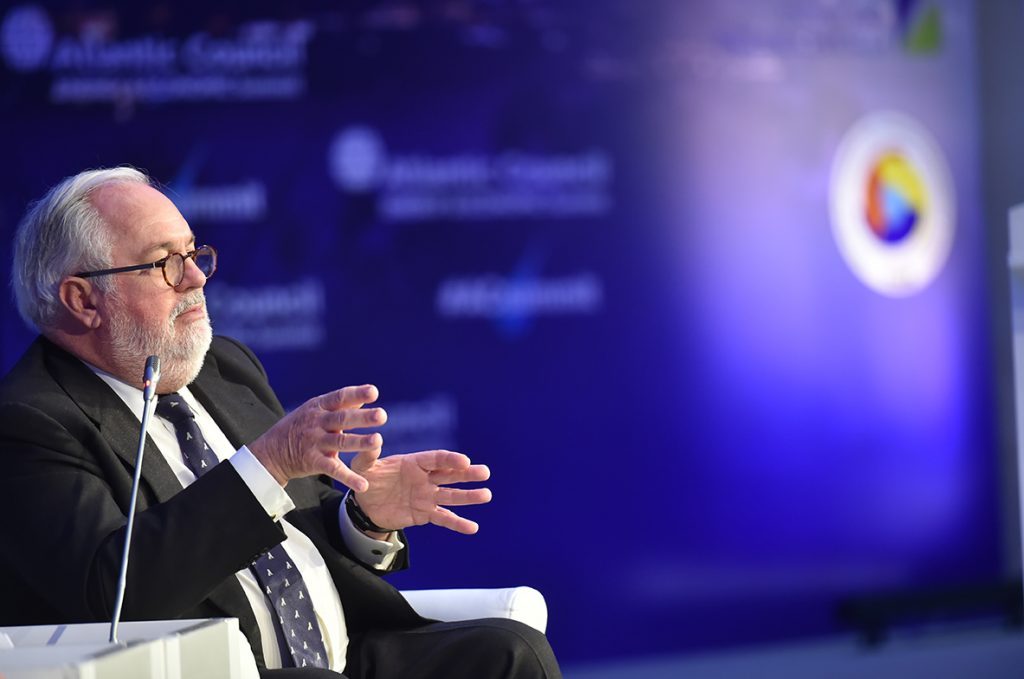
European Commission’s Miguel Arias Cañete says decisive action is needed to fight climate change
The European Union wants an “ambitious, robust, and binding global agreement that is fit for the future” at the United Nations’ climate summit in Paris this December, the European Commission’s top climate official said on Nov. 19.
More specifically, the EU wants a deal that is “dynamic and capable of putting us on track towards the internationally agreed objective to keep global warming below two degrees,” Miguel Arias Cañete, Commissioner for Climate Action and Energy at the European Commission, said at the Atlantic Council’s Energy & Economic Summit in Istanbul.
“Let me make our stance very clear: the EU will not sign any deal just for the sake of having a deal,” he said.
US President Barack Obama has committed to reaching a strong climate agreement at the COP21 in Paris. That goal has been put within reach by a landmark US-China deal to cap carbon emissions, and pledges from the EU and India to cut emissions. So far, 163 countries, which account for 94 percent of global emissions, have proposed reductions.
“We shouldn’t underestimate how huge a leap that is,” said Arias Cañete, pointing out that at Kyoto climate summit in 1997, only thirty-five countries representing around 12 percent of global emissions made a commitment to cut emissions.
While the commitments made so far are not enough to limit global temperature rise to two degrees Celsius, they are a clear signal that the world is serious about fighting climate change, Arias Cañete said, while describing Chinese investments in renewable energy over the past decade as “remarkable.”
Arias Cañete noted that some progress was made at a pre-summit ministerial meeting in Paris earlier in November. “There is no time for hesitation. We need to act decisively now if we want to avoid the worst effects of climate change,” he said.
The EU is seeking three key elements in a climate deal — first, a long-term goal in which global emissions peak at 2020 at the latest, are reduced by at least 50 percent from 1990 levels by 2050, and are near zero or below by 2100; second, a robust system to ensure countries stick to their commitments to cut emissions and a mechanism to hold accountable those that do not; and third, meetings every five years to strengthen and update emissions targets.
Arias Cañete said the EU has two other energy-related goals besides securing an ambitious, legally-binding climate agreement in Paris — strengthening its energy security and completing a robust energy union.
Energy security
Political tensions on Europe’s eastern border since Russia’s annexation of Crimea in March of 2014 have exposed the continent’s overreliance on Russia for its energy needs.
Over the past year, Europe has taken steps toward weaning itself off Russian energy, though energy security remains a pressing concern throughout the continent, Arias Cañete added.
“Now more than ever, the diversification of energy sources, routes and suppliers is crucial for our energy security,” he said.
Arias Cañete said several projects have been set in motion that will redefine the EU’s energy market and enhance its energy security. For example, the Gas Interconnector (GIPL) between Poland and Lithuania was launched in October, and the Southern Gas Corridor is now becoming a reality. Additional work is underway to deliver 10 billion cubic meters per year of gas from Azerbaijan to Europe in 2020 through the Trans Anatolian Pipeline (TANAP) and the Trans Adriatic Pipeline (TAP).
With vast reserves of energy to its east and demand to its west, Turkey is a “natural energy bridge” between the Middle Eastern and Caspian regions and EU energy markets, said Arias Cañete, thus Turkey will be key to helping Europe achieve energy security.
With this in mind, the EU has strengthened links with Turkey on the Southern Gas Corridor moving energy from the Caspian Sea to Europe, is developing a liquefied natural gas market, and it is looking to create a Mediterranean gas hub.
“The good news is that much of the strategic infrastructure needed is already in place. Our task now is to connect it,” the Commissioner said.
Energy union
A primary objective of the energy union is to ensure a “secure and resilient” energy supply that reduces overdependence on imports from one single source, supplier or route, said Arias Cañete.
There’s good news for Europe on the liquefied natural gas (LNG) front. A recent decline in LNG prices has made Europe more attractive market.
“However, we still lack a strategic vision on how to make the most of our import capacity in a truly integrated internal market,” said Arias Cañete, “that is something we need to address urgently.” This will include developing a strategy to make Europe an attractive market for LNG suppliers such as Algeria, Nigeria, and Qatar.
Europe is also looking for opportunities created by the landmark nuclear agreement with Iran, which will result in a lifting of sanctions; and is upgrading its strategic partnership with Ukraine, a key transit point for European energy imports.
The EU aims to strengthen energy security as well as cross-border cooperation through key proposals, including a new Security of Gas Supply Regulation focused on ensuring member states “act in a spirit of solidarity in times of crises”; and a comprehensive strategy for LNG and storage, said Arias Cañete.
Ashish Kumar Sen is a staff writer at the Atlantic Council.
Image: “We need to act decisively now if we want to avoid the worst effects of climate change,” Miguel Arias Cañete, Commissioner for Climate Action and Energy at the European Commission, said at the Atlantic Council’s Energy & Economic Summit in Istanbul on Nov. 19.

